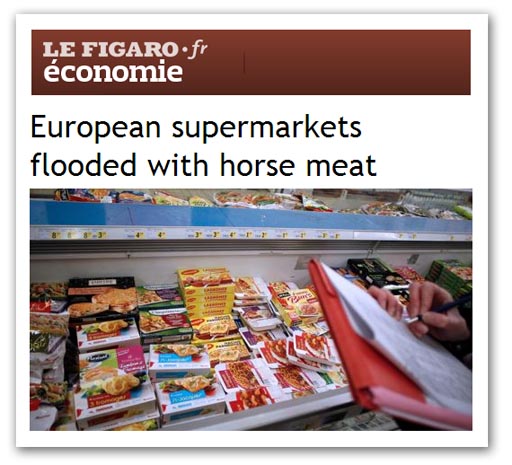"Fraudulent products", says the paper, have been found on the shelves of all the major chains of distribution in Europe. And, while the scandal has ballooned to more than 20 countries to date, the list of distributors and brands involved also grows.
One of the latest brands to be caught out is the Panzani group, the global past specialist which announced yesterday it had found traces of horsemeat in ravioli made by a French supplier and that the products had been withdrawn in France.
But, as the finding multiply more information emerges on the scale of the adulteration and the complexity of the supply network.
The Panzani ravioli, for instance, was manufactured by William Saurin. The company's ambition, it tells us, is "to offer the best products available to all and for all the family", with recipes "tasted and re-tasted by our team of experts in culinary arts before marketing to achieve culinary excellence".
It turns out, though, that to achieve its "culinary excellence", the company sourced some of its meat from the Dutch company Windmeijer Tradng BV. This had earlier been associated with rogue trader Jan Fasen, of Daarp Trading fame, who had used one of the company's cold stores in the Dutch city of Breda, storing horse meat which had been supplied to the Spanghero cutting plant.
The Dutch prosecutor has now started a criminal investigation into the affairs of Windmeijer, the second company to have attracted this sort of attention. The first was the Willy Selten plant in Oss, Netherlands, which was accused of mixing horsemeat and beef and selling it on as pure beef, after a raid on 15 February.
Those two cases, no doubt, are going to run and run. In the meantime, we also have a report fromPortugal, with the authorities seizing 79 tons of beef containing horsemeat. We hear also that 19,000 food packs, "such as lasagne, hamburgers, canneloni and meatballs" have been removed from retail and distribution outlets.
Also, beef lasagne containing horsemeat has been discovered in Hungary, according to Gyorgy Pleva, Director of Hungary's National Food Chain Security Office. This does not seem to be a new contamination episode though, as the lasagne was imported into Hungary by the Danish company Nowaco and produced by the Luxembourg-based firm Tavola, the subsidiary of Comigel which produced the product for Fundus.
What is certainly a new episode, though, is a report from Latvia. The Food and Veterinary Service has established suspicious activities with horsemeat at several Latvian slaughterhouses and companies. It has been established that 416 horses were slaughtered in Latvia in 2012, including 272 at an AIBI slaughterhouse.
Their meat, it is reported - amounting to 203 horses - was supplied to meat-processing company Forevers and it is "already clear" that AIBI horsemeat was labelled as beef in nearly all cases. There have also been violations established at three other slaughterhouses and a meat supplier.
Nor have the Swedes finished yet, as IKEA has decided to withdraw its wiener sausages from sale after tests found "indications" of horsemeat. The company is removing the sausages from sale in Britain, France, Spain, Ireland and Portugal after tests confirmed "a few indications of horsemeat".
Russia is also getting in on the act, complaining that a shipment of 20 tons of hot dogs "tainted" with horsemeat had been exported from Austria by the Landhof company in Linz. The Russian Federation is now considering taking unspecified "protective measures". Unlike the cases elsewhere, the sausages were labelled not as pure beef but as containing only pork.
Landhof tells us that the entire production chain, "works with the HACCP concept, which deals specifically with the hazard and risk analysis". The products are tested for their hygienic condition and chemical composition in the in-house laboratory,. The very strict Austrian Food Codex guarantees the consumer with additional top quality.
Back in Britain, seven councils have withdrawn certain meat products from schools and care homes after Swansea council said its own test found horsemeat in products supplied by Welsh Bros Ltd of Newport. The company said it was shocked and "had been let down by a non-Welsh firm".
Welsh Bros is another one that tells us they operate a fully documented Food Quality and Safety system, using HACCP principles where they "identify possible hazards with our products and processes" and "put controls in place to ensure safety is maintained". Their measures, they say, "are regularly monitored and information documented". This system is under constant review to identity where any improvements are made.
They go on to say that all carcasses are purchased from licensed and approved suppliers. "Specifications are agreed so that the correct product is always supplied to us" and "these specifications are verified via goods inwards checks which are conducted by our Technical Manager upon receipt to deliveries".
“Inferior product”, they claim, "is rejected and retuned (sic) to supplier with only products which have the quality we demand passing these important checks".
Thus we come to the NFU conference in Birmingham, were farmers were said to be angry, withplatitudes flying about buying more British produce and preventing "another horsemeat-style scandal".
The trouble is, as we see from the European Parliament, there is still no real understanding of what has happened. MEPs are calling for more meat tests along the food chain, but felt that the issue was one of "labelling and traceability".
They cannot seem to get to grips with the idea that we are experiencing criminal fraud on a massive scale, and all the labelling in the world will not make it better. Weeks into this "scandal" and we are really not much further forward. The entertainment is set to continue.
COMMENT: "HORSEMEAT" THREAD
